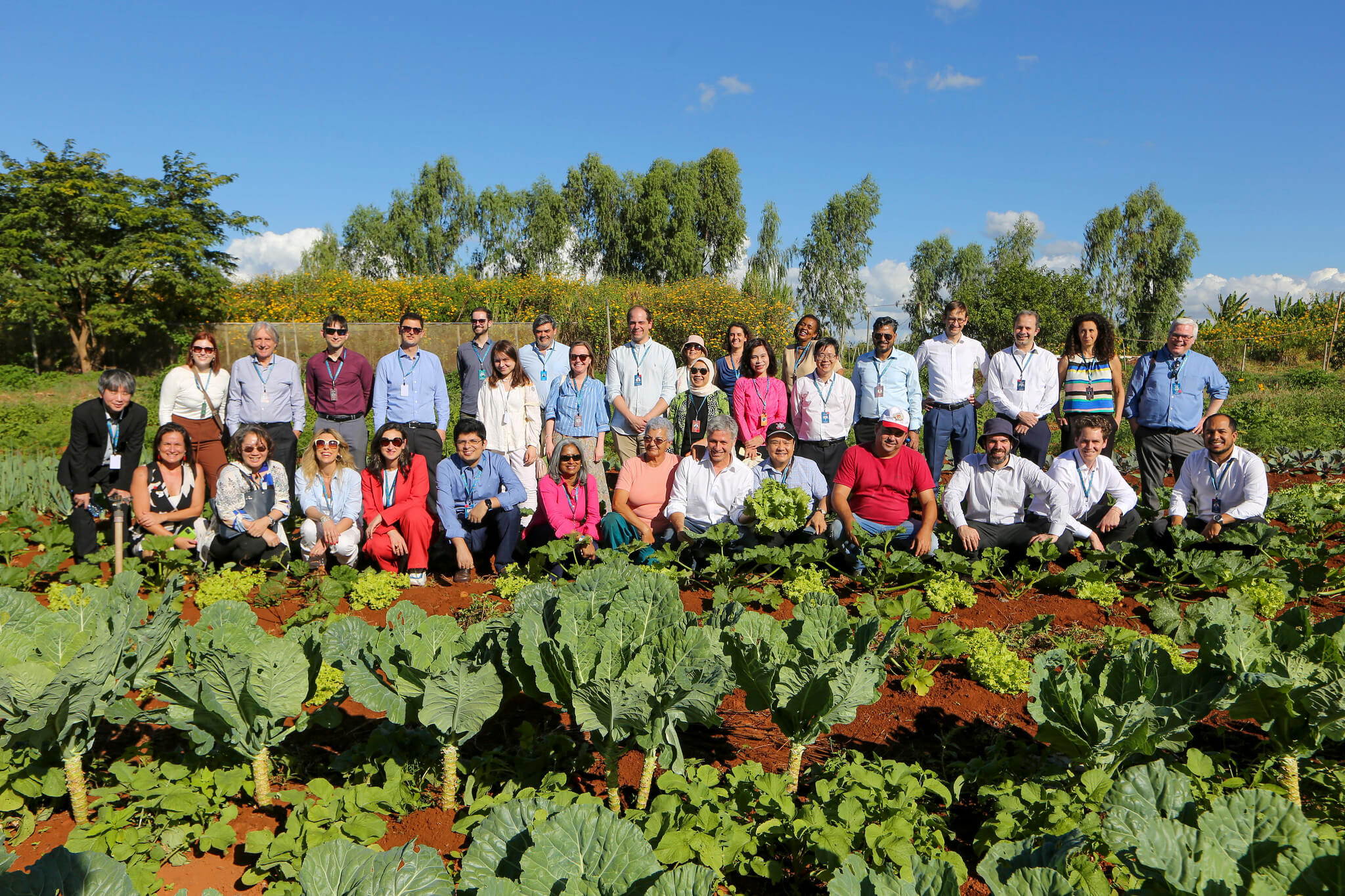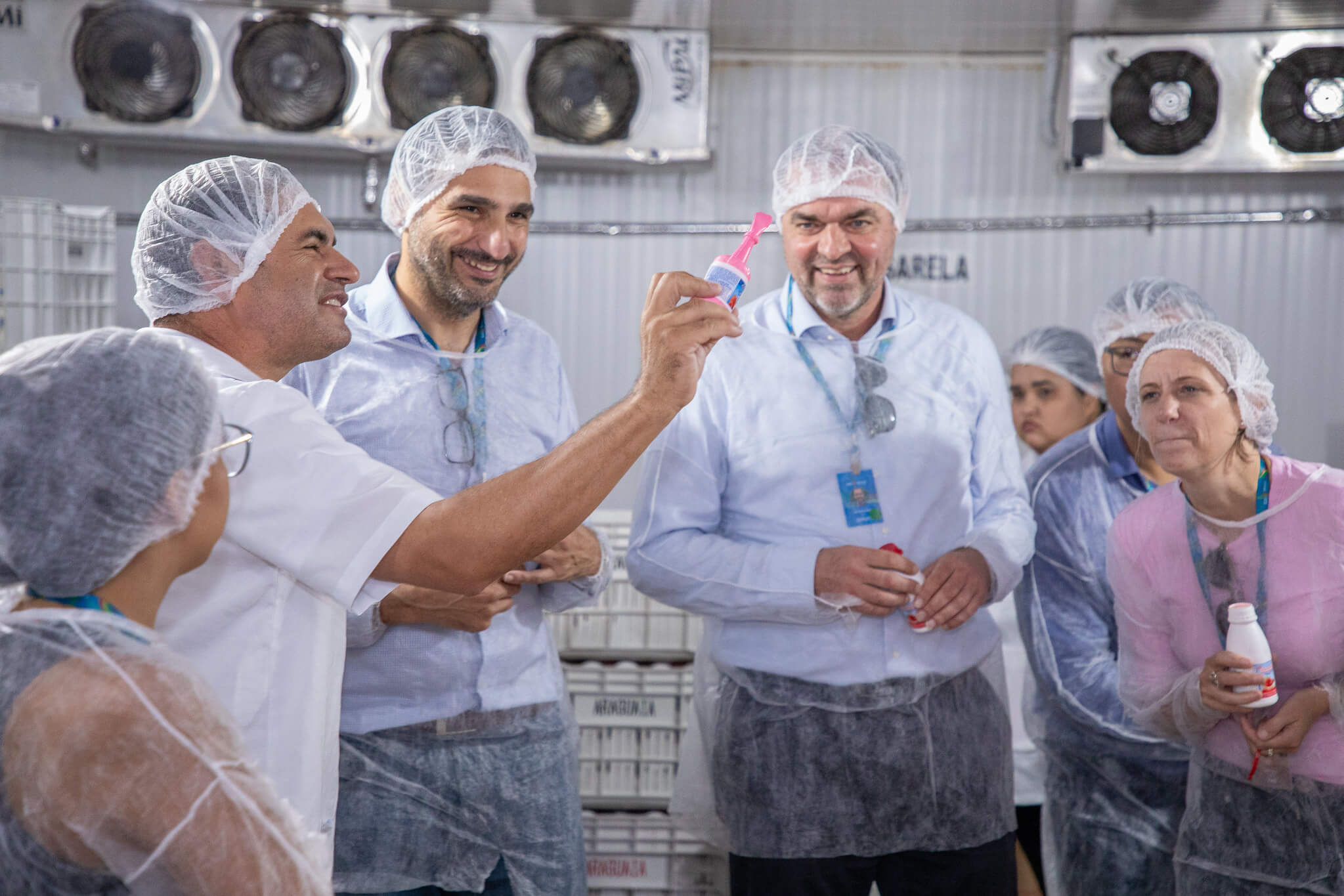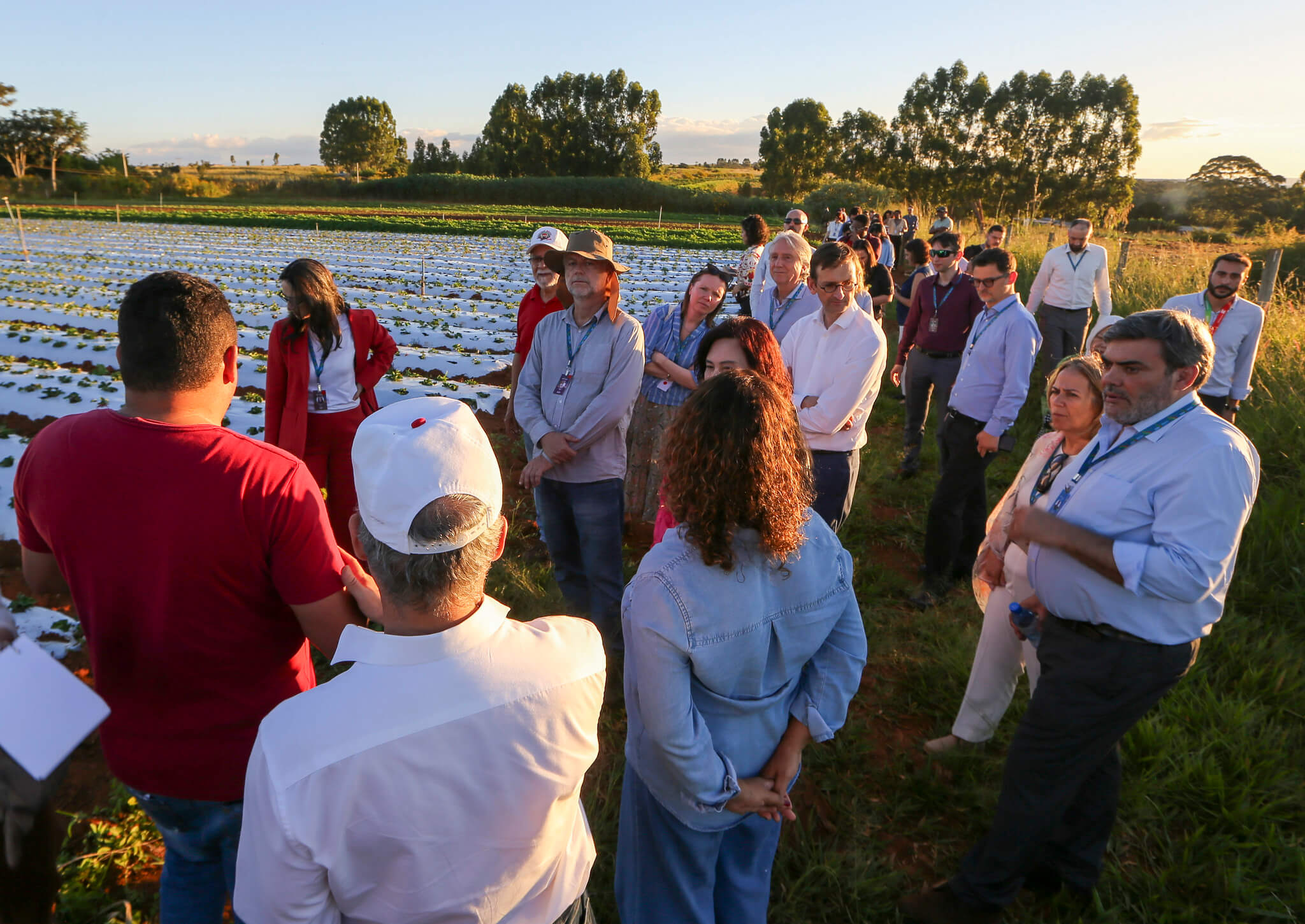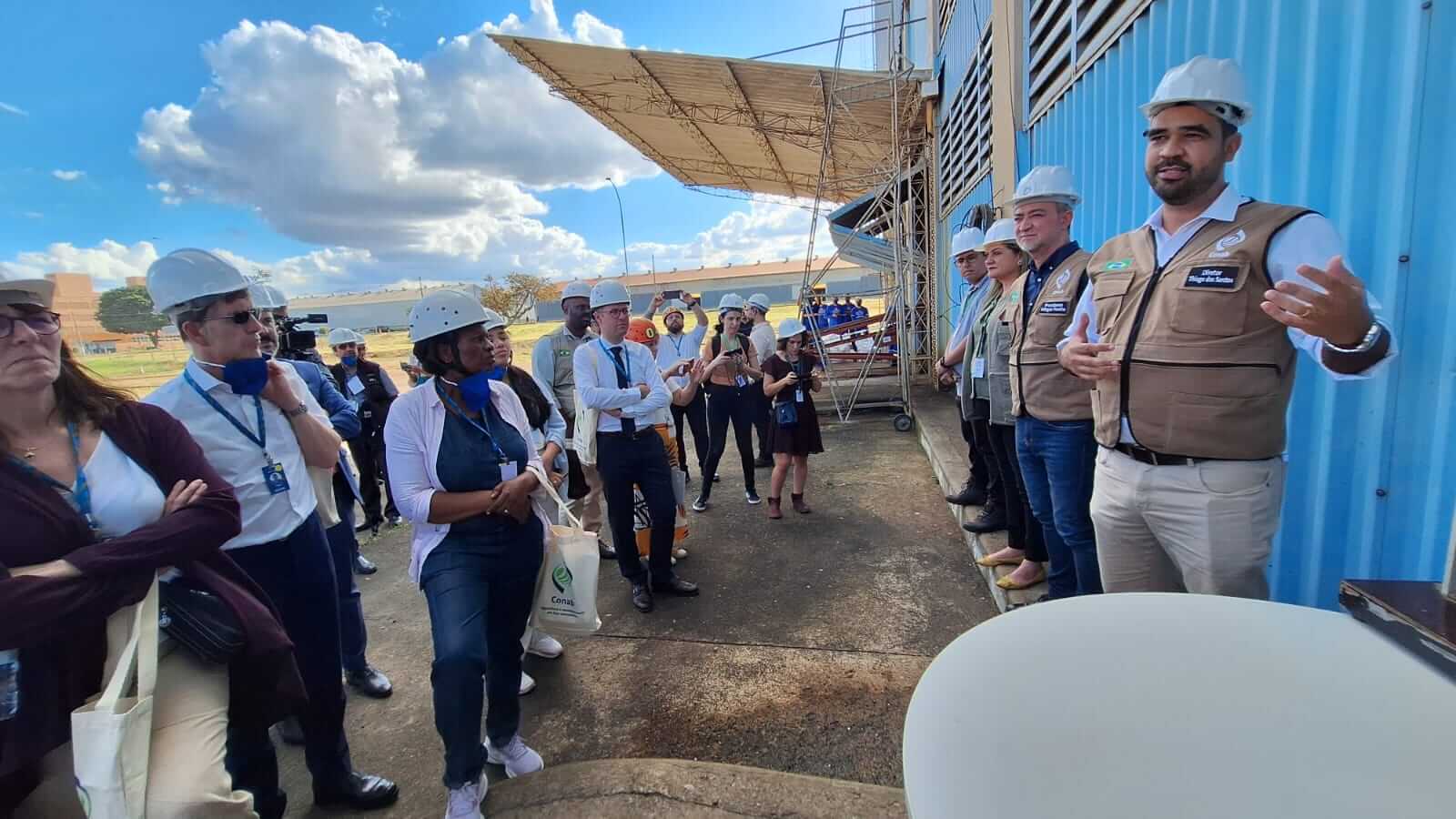G20 beyond the meeting rooms: Agriculture WG visits family farmers
The initiative gave G20 delegates a practical introduction to the cycle of Brazilian public policies aimed at family farming, an unprecedented topic in the official discussions of the G20 Agriculture Working Group. Delegations from 29 countries were divided between three routes, all close to the Federal Capital. Visits were conducted to a settlement, a cooperative, and public warehouses, illustrating the various stages impacted by Brazilian policies for family farming: production, processing, and distribution. These efforts yield tangible outcomes such as job creation, income generation, hunger and food insecurity alleviation, and the promotion of sustainable environmental stewardship.

International authorities outdoors, engaging in discussions and experiencing topics related to the G20 amidst supply warehouses, vegetable harvesting, soil management, and dairy preparation. Surely, this is not the typical imagery associated with G20 meetings. This was the proposal set forth by the Ministry of Agrarian Development and Family Farming of Brasil (MDA) for the second meeting of the Agriculture Working Group (GT) held in Brasília, Brazil.
Approximately 608 million family farms worldwide, covering areas smaller than two hectares, account for over one-third of global food production. This statistic, from the Food and Agriculture Organization (FAO) of the United Nations, underscores the significance of discussions surrounding family farming. Notably, these discussions were included in the G20 agenda for the first time this year, under the purview of the Agriculture Working Group.
With the aim of emphasizing the role of family farmers in addressing hunger, poverty, and climate change—central themes of the Brazilian presidency in the group of the world's largest economies—the MDA decided to venture beyond the confines of the technical meeting's four walls. Instead, they took the delegates to the red earth of the Cerrado biome, outside the G20 headquarters building.
Approximately 608 million family farms worldwide, covering areas smaller than two hectares, account for over one-third of global food production. This statistic, from the Food and Agriculture Organization (FAO) of the United Nations, underscores the significance of discussions surrounding family farming. Notably, these discussions were included in the G20 agenda for the first time this year, under the purview of the Agriculture Working Group.
Engaging with farmers, witnessing agricultural processes, and exploring agricultural products were experiences shared by 50 delegations from 29 countries during field visits at the end of April. Delegates had the option to select from three distinct itineraries, allowing them to observe firsthand the influence of Brazilian public policies on the sector. The visits were divided among National Supply Company (Conab) warehouses, the Indaiá Cooperative, and the Chapadinha Settlement, all situated in areas near the Federal Capital.
Indaiá Cooperative

Established in 2013, Coopindaiá is dedicated to the sale of milk and dairy products. During the visit, led by Luciano Andrade, a founding member of the cooperative and its current CEO, representatives from member countries and guests had the opportunity to learn about the production process, marketing strategies, and farmer relations. Of course, they also sampled a variety of cheeses, yogurts, and other products. The cooperative processes an average of 100,000 liters of milk daily, sourced from approximately 700 different producers in the region.
"I think the most important thing is to really see how things are happening at the grassroot level in the various G20 countries. Seeing and touching, feeling and smelling the products really gives you a perspective on how things work and how we can exchange lessons," said Caroline Wardrop, from the Australian government's Department of Agriculture, Fisheries and Forestry. She also highlighted the impact of cooperatives on communities.
"For some years now, countries have been working towards the 17 Sustainable Development Goals (SDGs) established by the United Nations (UN). Many of them are related to agriculture, in the sense of sustainable production, income, environmental protection, so it was very interesting to see this initiative," added Bart Vrolijk, from the Dutch government's Ministry of Agriculture, Nature and Food Quality, agreeing with the emphasis on discussions about family farming in the G20.
Chapadinha settlement

Together with MDA minister Paulo Teixeira, the international representatives who visited the settlement could see the work of 46 families who produce a variety of organic fruit, legumes and vegetables on an area of 435 hectares. The Association of Workers and Family Farmers of Chapadinha (ASTRAF) is on a journey of land restoration, prioritizing agro-ecological practices combined with social and economic organizational processes.
"Family farming provides food for people's tables all over the world. For the first time, the G20 is taking this policy into consideration. That is why we are here, in a settlement, showcasing the range of public policies for access to land, credit, public purchases, photovoltaic solar energy, irrigation, technical assistance, in short, a menu that demonstrates how to strengthen food production," said Paulo Teixeira on the occasion.
National Supply Company

The authorities were able to visit the headquarters of Conab, the Brazilian state-owned company with a presence in all regions of Brasil, comprising 26 state superintendencies and 64 storage units that ensure the country's food supply. The company's responsibilities include providing agricultural intelligence, contributing to public policy formulation and implementation, and supporting income generation for rural producers.
"We can present several policies here that Conab develops for small, medium, and large producers, ranging from institutional product purchases to food inflation control through public stocks, in addition to showcasing our future plans, which include expanding our capacity to assist farmers," said Edegar Pretto, president of the National Company.
The importance of public policies for worldwide family farming
What is the connection between the three itineraries and their relevance to the global discussions within the Agriculture Working Group? We delve into the role of states in formulating and executing public policies for small-scale farmers. The sequence of visits to settlements, cooperatives, and public warehouses illustrates the successive stages of impact stemming from Brazilian policies for family farming: production, processing, and distribution. These efforts yield tangible outcomes in terms of job creation, income generation, hunger and food insecurity alleviation, and sustainable environmental stewardship.
During the visit, policies like theFood Acquisition Program (PAA) and the National School Meal Program (PNAE) were presented to the foreign delegations, with enthusiastic reception as possible models for their own countries. For instance, the PAA, a flagship initiative managed by Conab. was highlighted for its pivotal role in hunger eradication, with active participation from both the Sobradinho Settlement and Coopindaía.
In 2014, the PAA emerged as a cornerstone in Brasil's efforts to eradicate hunger, effectively removing the nation from the Mapa da Fome. Since its establishment, the program has procured roughly 5.5 million tons of food from family farming, distributing it to community restaurants, daycare centers, philanthropic organizations, and educational institutions across the country.